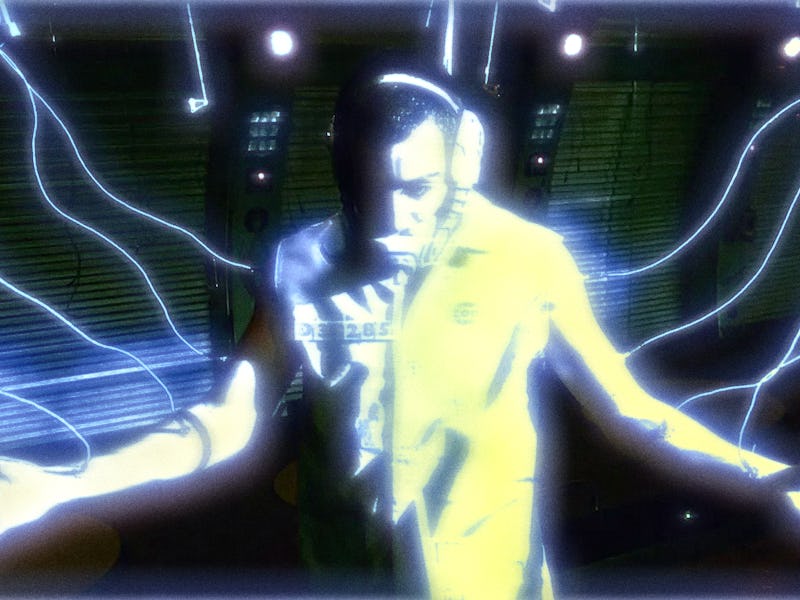Sleep Dealer Is a Dark Reflection of Our Current World — And a Warning of What’s to Come
This $2 million sci-fi thriller accomplishes more than most big-budget movies.

River water no longer belongs to the residents of Santa Ana del Rio, a small town in the Oaxaca region of southern Mexico. Instead, a U.S. company owns rights to the precious liquid and ships it north for American consumption. Local farmers must buy back their own water at a premium, while security forces wielding military weapons murder any “burglars” on sight.
That’s the initial setup for the not-so-far-fetched first feature by visionary director Alex Rivera. Sleep Dealer explores the extraction of resources and labor from the Global South, mixing real-life issues with science-fiction technology. Fifteen years after this independent film’s release in 2008, the sociopolitical issues it cleverly addresses have only grown more urgent.
Sleep Dealer stars Luis Fernando Peña as Memo, a young man eager to leave his waterless hometown. Memo’s family still tries to grow crops on its arid land, and he builds a radio to pass the time and intercept conversations from beyond his limited world. But when his device causes him to be mistaken for an “aquaterrorist,” it leads to his father’s brutal demise at the “hands” of a Mexican American soldier, Rudy (Jacob Vargas), operating a deadly drone.
The tragedy forces Memo to travel to Tijuana, where migrants no longer seek to physically cross the border now that a wall (which plenty of American far-right extremists salivate today over) has been erected. Instead, “coyoteks” (a play on the “coyotes” who smuggle people across the border today) illegally install metallic nodes on a person’s body so they can telecommute across the border. Their bodies stay in Mexico, inside networked factories called sleep dealers, while they remotely control robots that perform manual labor jobs in the United States.
Work without the workers. The perfect and cost-effective outsourcing of essential tasks that solely benefits the technocrats. Meanwhile, the exploited many are drained of their energy in exchange for crumbs to survive without the possibility of ever even partaking in the illusory concept of the American Dream. Calling this plan despicable barely suffices.
Sleep Dealer imagines a future where the U.S.-Mexican border is sealed off but companies still find a way to exploit foreign workers.
Rivera uses practical effects to represent this technology, giving it a grounded-yet-otherwordly look. Employees wear an oxygen mask to stay alert during shifts. They work at night, hence the “sleep dealers” moniker. Blue cables attach to nodes on their arms and back, evoking the image of a puppet hanging from its master’s strings. Instead of the usual virtual-reality goggles, the director opts for high-tech contact lenses that allow telecommuting workers to look through the eyes of their robot counterparts.
Memo wishes to connect his “nervous system into the global economy” to send money back home to his mother and brother. That’s where Luz (Leonor Varela), a young writer with a few side gigs, comes in. Aside from working as a seasoned coyotek, Luz sells clips of own her memories through a digital platform. Nothing is sacred in this future. Every thought and emotion can be commodified for profit.
There’s a moment when Memo, plugged in and working as a welding robot on a high-rise building in Los Angeles, catches his reflection. That’s when he realizes that in the United States, his body is that of a machine getting the work done from afar and for cheap, no longer that of a human being. He’s undergone the ultimate form of dehumanization. His American boss doesn’t know his name or even his face. He’s nothing but a piece of hardware to them.
Poster art for Sleep Dealer.
Rivera also uses computer-generated animation to depict the human-controlled machinery that has replaced flesh-and-bone farmers and construction workers. The collection of brilliantly resourceful elements in Sleep Dealer (made for just $2 million), all in service of its hard-hitting ideas, make one wonder what Rivera could accomplish with a larger budget.
“I work in a place I’ll never see,” Memo later tells Luz, once the two are romantically involved. The protagonist is coming to terms with his insignificance in the power plays of those who rule the masses. Peña’s expressive eyes communicate a profound disenchantment, not only with the position he holds “dealing” but with what he had imagined he could do if only he left home. This humble hero is not without agency, however, as his final revolutionary act confirms. Faced with a new world order where the artificial reigns, Memo learns the importance of his father’s work as a farmer who cared for the land.
Luis Fernando Peña (left) stars as Memo.
That the person materially responsible for murdering Memo’s dad is a man of Mexican descent trained to defend U.S. interests speaks to how the systems of oppression will manipulate even those they often ostracize, offering them a false sense of belonging to do their bidding. In trying to mend the relationships between the perpetrator and the victim’s son over the course of the story, Rivera advocates for their solidarity against a common enemy.
With the advent of artificial intelligence and the rapid automatization of all services, perhaps what’s coming for us is even more drastic and dangerous than what Rivera envisions here. When the corporations and their allies in places of influence no longer have a use for the bodies of their workers, whom they so bluntly despise, how will they try to exploit us next?
This article was originally published on